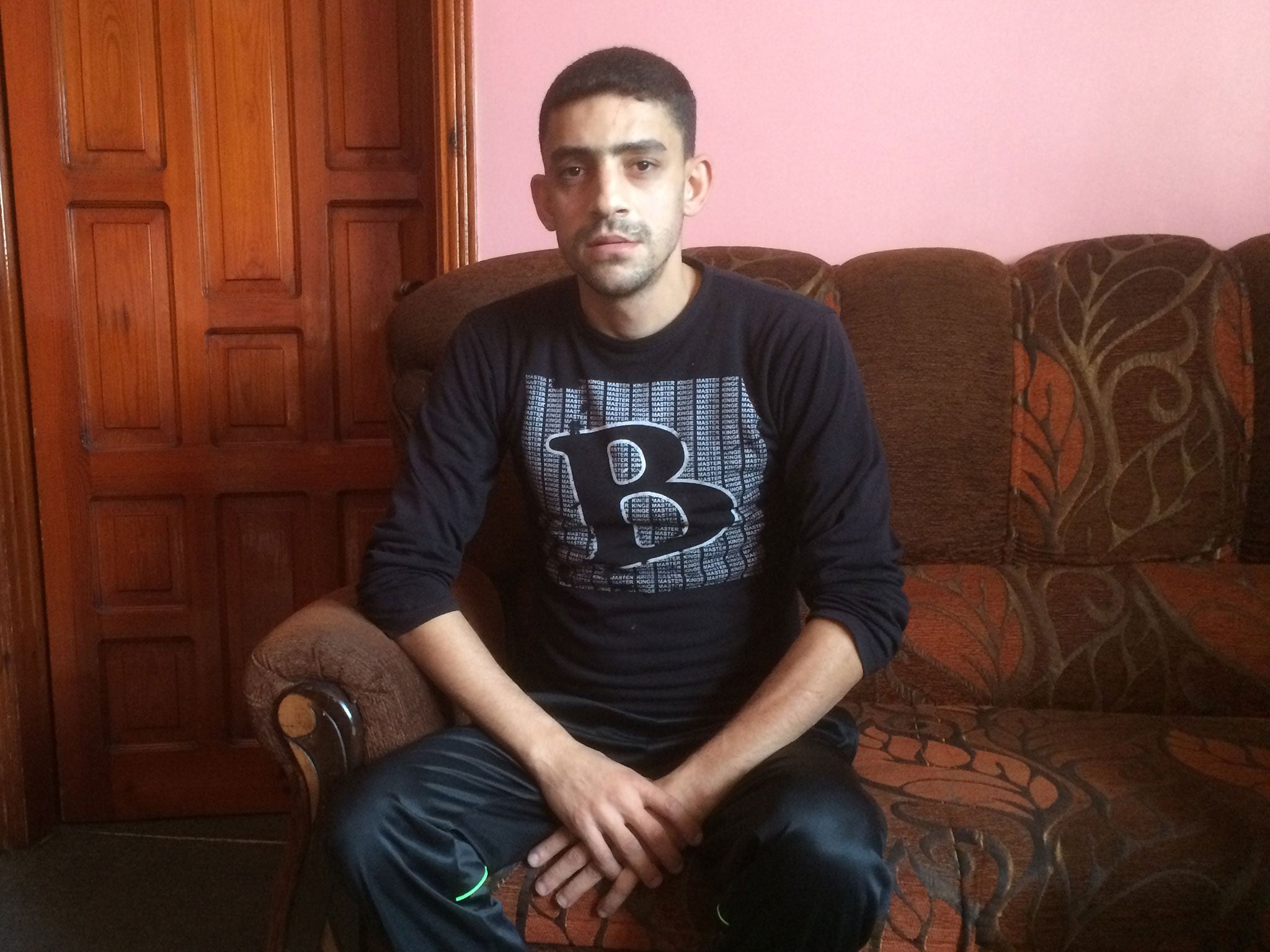Palestinian patients suffer as Israeli crackdown on exit permits keeps them away from hospital
Nearly a third of applications to travel for medical treatment have been denied this year and reasons are seldom given

Since he was diagnosed in infancy with cystic fibrosis, Mahmoud Kuweifi, 24, has been allowed out of Gaza for regular treatment at Israel’s world-class Tel HaShomer hospital, for whose medical staff he and his family have nothing but praise.
“I like them very much,” says Mr Kuweifi, adding only half-jokingly: “If I could claim asylum there, I would.”
According to his mother, Suzanne, 50: “The doctors there have become really good friends. They raised him.”
The warmth with which Mr Kuweifi’s parents describe “the Jews” who have cared for their son would be striking even if they didn’t live in the eastern Gaza City neighbourhood of Shejaiyia, scene of perhaps the worst death and destruction during the 2014 war.
His father, Mohammed Kuweifi, 53, a tailor, talks volubly about the kindness and professionalism of Tel HaShomer’s doctors in treating his son’s incurable, but manageable, disease. During the war, he got a call from the hospital to check on how his son was doing.
Which is why he is so upset that the young man had to miss two appointments last month because the Israeli military didn’t grant him a permit to cross into Israel. Especially when his fluctuating condition worsens, as it did last Wednesday when Mr Kuweifi suffered stomach pain and vomiting. With his immune system compromised, any infection could be a major threat.
Mr Kuweifi said: “I was doing relatively well before but now I’m worried I might be getting ‘flu.”
Saying he feels “so confused” about the refusal, he added: “I am not in any of the factions. I feel helpless.
“I don’t want to say I’m desperate, but I am being careful not to get infections. If I get ill, I might die.”
Overshadowed by the 2,131 Palestinian deaths and 11,000 injuries inflicted by the war, Mr Kuweifi’s problem is just another detail of a dismal aftermath. There remains devastation: only one of the 7,000 totally destroyed housing units for which the UN refugee agency UNRWA is responsible has been rebuilt, there are daily power cuts, a dire shortage of clean water, the unemployment rate is the highest in the world, and Gaza’s 1.8 million population remains effectively imprisoned in the enclave.
But Mr Kuweifi’s experience is also part of a pattern. While Israel almost trebled the number of exit permits from Gaza after the war to an average 13,832 per month, that number has started to decline again. And the proportion of permits refused for hospital treatment in the West Bank, East Jerusalem and Israel has also risen.
The Israeli military declined to say why Mr Kuweifi had been refused but insisted its “criteria remain unchanged”.
Demand for exit permits has grown this year after Egypt closed the southern Rafah crossing for all but 19 days, yet only 69 per cent of medical applications were approved, with 11 per cent or 255 patients denied permits and 19 per cent receiving no response.
Reasons are seldom given. Last week the Palestinian civil-affairs committee was told that “companions” aged 16-55 would not be allowed to accompany patients without often protracted security checks, including interviews with Israeli intelligence.
It’s tempting to see the rise in denials as a security measure triggered by the recent violence in Israel and the West Bank. But in fact it began in August. Many referrals result from shortages of drugs and equipment in Gaza’s hospitals, which are also unable to offer either radiography or PET cancer scans.
Mahmoud Daher, the senior World Health Organisation official in Gaza, says equipment repairs are often impossible because necessary spare parts fall foul of Israel’s “dual-use” list of items which could be used for militants’ weaponry – or because to send the machines out of Gaza would contravene parallel export restrictions. Of six haemodialysis machines which have broken down, “we could repair six for the cost of buying one new machine”, he said. “But we can’t do that.”
With most referrals being to hospitals in the occupied West Bank and East Jerusalem, Mr Daher says that preventing patient transfers from one part of occupied territory to another violates Israel’s international humanitarian obligations.
“We respect Israel’s security concerns,” he said, “but they should not hamper access to health services. They have installations which can detect a paper in your pocket, let alone weapons.”
Mahmoud’s next appointment is more than a month away – if he gets a permit.
Frightened his illness will undergo a crisis before then, his mother said: “I am preparing myself to bury him.”
Such fears are surely premature but Mr Kuweifi wants an earlier appointment, as he says he’s run out of the antibiotic he needs.
Mrs Kuweifi added: “In Gaza they don’t know how to treat cystic fibrosis. They always say: ‘You have to go to Israel’... Please find out why he has been denied.”
Join our commenting forum
Join thought-provoking conversations, follow other Independent readers and see their replies
Comments
Bookmark popover
Removed from bookmarks